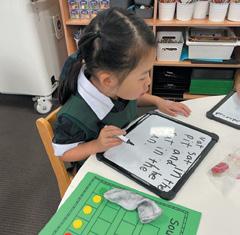
4 minute read
Curriculum Reform – English K-2
The first comprehensive reform of the NSW school curriculum in three decades has begun. New South Wales is at the forefront of revitalising all curricula, equipping students to continue contributing to Australian society in the 21st century, and the English and Mathematics K–2 syllabuses are the first to be implemented.
They are essential in establishing foundations for future learning success, particularly the development of oral language, reading, writing, mathematical knowledge and skills.
Whilst the Junior School staff have participated in professional learning to familiarise themselves with the new curriculum to be implemented in 2023 and 2024, Kindergarten teachers commenced the journey to plan collaboratively and administer the new K-2 English curriculum this year. As part of the NESA TENS (Teacher Expert Network) Friends, PLC Sydney teachers were given the task of providing direct feedback to NESA through user testing. To facilitate this effectively, Kindergarten teachers also embarked on their own study, reflecting on current practice and interrogating the evidence and research that underpin the new K-2 English syllabus.
“Our role (as teachers) is not to simply implement curriculum reform but to leverage it in the service of the purpose of education.” Dr Santiago Rincon-Gallardo (Education Consultant, Chief Research Officer at Michael Fullan Enterprises)
The new curriculum focuses on laying deep foundational literacy skills, with new outcomes and content informed by irrefutable evidence. Skills are identified that are required by all students to develop competence in oral language, reading and writing and content is structured and sequenced to highlight the connections across these areas.
So how does this translate to the classroom?
A bespoke program for Kindergarten was developed by the teaching team, focusing on the foundational skills: oral language, phonological awareness, phonics, vocabulary, reading fluency, and the conceptual understanding of oral communication, (vocabulary) and reading comprehension, creating written texts and understanding and responding to literature. Each class participated in daily structured lessons incorporating: 1. Oral communication development through high-quality interactions between students and teachers, modelling language structures as well as explicit teaching of vocabulary.
Oral language skills form the
“bedrock” of all reading and writing.
2. A phonological awareness program (“Heggerty” where students learn and practise manipulating words by recognising and blending sounds). 3. A Systematic Synthetic Phonics program (a method of teaching where words are broken up into the smallest units of sound (phonemes)) and opportunities are provided for reading practice such as paired readings of decodable texts to develop accuracy and fluency.
4. Comprehension, directly targeted through instruction. The understanding of text derives from combining the foundational skills of phonemic proficiency and decoding fluency, vocabulary, understanding of language structures, and background knowledge.
The body of scientific research into reading acquisition strongly reinforces the importance of decoding. In practice, the girls in Kindergarten this year have mastered the alphabetic principle - they understand that spoken language is made up of phonemes and these phonemes are represented by graphemes (spelling choices). It has been incredibly exciting helping them develop fluency and automaticity as they discover they can read independently. By the end of the year, many girls were able to read with fluency and expression, and could decode multisyllabic words containing digraphs (a combination of two letters representing one sound) and less-common spellings.
The teaching of writing starts at the word level. Kindergarten focused on learning why some spelling choices are used. There was great joy in hearing the girls explain back to the teachers: “The /j/ sound in ‘edge’ has to use the ‘ge’ spelling because no English word ends in ‘j’.” And:
“The word ‘cliff’ has to have the ‘ff’ digraph because it is a single syllable word with a short vowel in the middle”.
These quotes from our Kindergarten girls display not only a genuine understanding of the rules around English spelling but our high expectations of their ability to achieve success. This confidence will set the girls up for a lifetime of decoding and encoding - the essence of effective reading and writing.
From words, students moved to sentence level using accurate punctuation. The explicit teaching of grammar and syntax in writing ensures the foundational elements of writing are a solid platform from which to build in later years. The girls have explored different sentence structures and can confidently write simple, compound and complex sentences to help them articulate their growing understanding of the world. Expanding vocabulary through the development of background knowledge and explicit word instruction has given them tools to express themselves with precision and clarity. The rich language environment and rigorous program implemented in Kindergarten this year have opened a window into the exciting journey that PLC Sydney now finds itself on in the Junior School. Next year, the Stage 1 English and Mathematics syllabus will be rolled out. Stage 1 will utilise the “InitiaLit” program, designed by Macquarie University to target essential key skills required for continuing literacy development during the second and third years of schooling.
At PLC Sydney, we are invigorated by the new curricula and look forward to further collaboration to deliver educational experiences that ensure dynamic and exceptional learning outcomes for our girls.
Ms Carolyn Lain
Junior School EALD Teacher and English Coordinator
Mrs Elizabeth Lechlein, Mrs Sarah Marvell and Mrs Sonia Weston
Kindergarten Teachers











